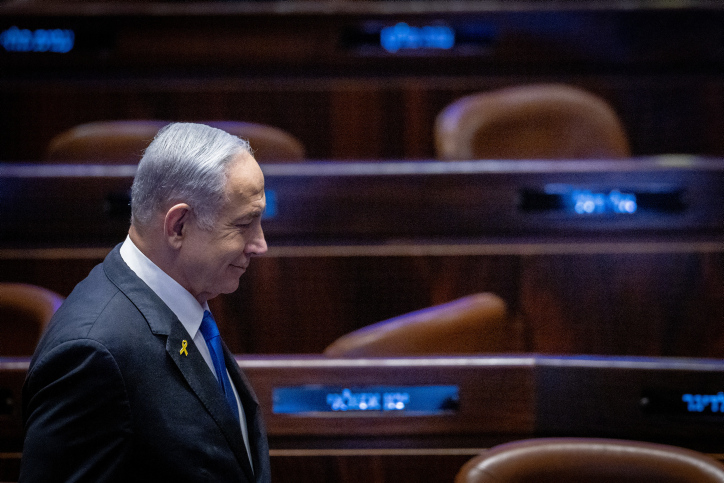The weekly and largely left-wing anti-government demonstrations in Israel receive a lot of media coverage, which can give the impression that political leanings in the Jewish state have dramatically shifted as a result of the war.
But a new poll shows again that while Benjamin Netanyahu’s time as prime minister might be coming to an end, the Israeli public remains strongly right-wing.
First, it should be stressed that while Israelis have by-and-large lost confidence in Netanyahu, the same is true of all current party leaders in the Knesset.
In the poll conducted by i24News, a plurality of respondents indicated they weren’t particularly thrilled by any of the current candidates for prime minister.
- Between Netanyahu and National Unity party leader Benny Gantz: 31% would chose Gantz, 27% Netanyahu and 42% prefer neither.
- Between Netanyahu and current opposition leader Yair Lapid: 31% prefer Netanyahu, 29% Lapid and 40% neither.
The only candidate with a clear lead over Netanyahu is former Prime Minister Naftali Bennett, but he is currently retired from politics.
Coalition falls, but right remains strong
If elections were held today, the i24News poll predicts the next Knesset would look like this:
- National Unity (Benny Gantz): 22 seats
- Likud (Netanyahu): 21 seats
- Yesh Atid (Yair Lapid): 15 seats
- Israel Beiteinu (Avigdor Liberman): 14 seats
- Shas (ultra-Orthodox party): 11 seats
- Jewish Power (Itamar Ben-Gvir): 10 seats
- United Torah Judaism (ultra-Orthodox party): 8 seats
- The Democrats (Labor-Meretz left-wing alliance): 8 seats
- Ra’am (Mansour Abbas): 6 seats
- Joint Arab List: 5 seats
Religious Zionism (Bezalel Smotrich) and New Hope (Gideon Sa’ar) would fail to pass the electoral threshold.
In relation to the current coalition, a shallow analysis of these results (which is all the mainstream media is offering) suggests bad news for the Netanyahu government, which is portrayed as representing the religious right.
- 50 seats for the current coalition parties (Likud, Shas, Jewish Power, UTJ, Religious Zionism)
- 65 seats for the current opposition (National Unity, Yesh Atid, Israel Beiteinu, The Democrats, Ra’am)
- 5 seats for the Joint Arab List (which won’t join any “Zionist” government)
But there’s more to consider here.
First, for all the vitriol hurled at Itamar Ben-Gvir, his ultra-nationalist Jewish Power party gets stronger, going up from its current 6 seats to 10 seats in the next Knesset.
And if Jewish Power is seen as the most religious of the right-wing nationalist parties, its secular counterpart, Avigdor Liberman’s Israel Beiteinu, also grows considerably from its current 6 seats to 14 seats in the next Knesset.
But who would be prime minister?
True, the parties that are currently willing to sit under Netanyahu as prime minister would only control 50 seats if this poll holds true. So Gantz would almost certainly be given first crack at forming the next government. And he might even pull together a majority coalition. But how long would it last?
Gantz’s coalition, assuming the above results, would consist of parties with strongly opposing viewpoints on critical issues, in particular Israel Beiteinu on one side, and The Democrats and Ra’am on the other.
The previous government headed by Lapid and Bennett was similarly fractured and fell after just one year.
The other right-wing option
It’s clear that the Israeli public wants a right-wing government. If you remove Netanyahu from the picture and just look at the parties, the above poll results give 64 seats to openly right-wing and/or religious parties (Likud, Israel Beiteinu, Jewish Power, Shas, UTJ).
If you consider that Gantz’s National Unity is a centrist party with not a few firmly right-wing members, the preference for conservative leadership is even clearer.
This is further reflected in a hypothetical option presented by the i24News poll – a new right-wing alliance consisting of Liberman’s Israel Beiteinu, Gideon Sa’ar’s New Hope, a new party headed by Bennett, and popular former Mossad chief Yossi Cohen.
In an election that included that hypothetical faction, the results would be:
- Liberman-Sa’ar-Bennett-Cohen alliance: 33 seats
- Likud: 17 seats
- National Camp: 14 seats
- Yesh Atid: 11 seats
The remaining parties are largely unchanged.
That’s 76 seats, give or take a couple, to openly right-wing and/or religious parties, and another 14 to the centrist National Camp.
Israelis overwhelmingly prefer a right-wing or conservative government, but not necessarily with Netanyahu at the helm.
Next election – when?
Just 42% of respondents said Israel should go to early elections now, which is what anti-government protesters have been demanding in their demonstrations.
Fifty-five percent say elections should only be held after the war (33%) or at the scheduled date in October 2026 (25%).














